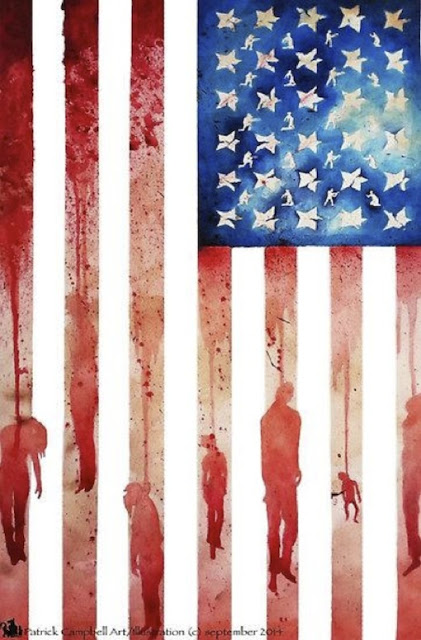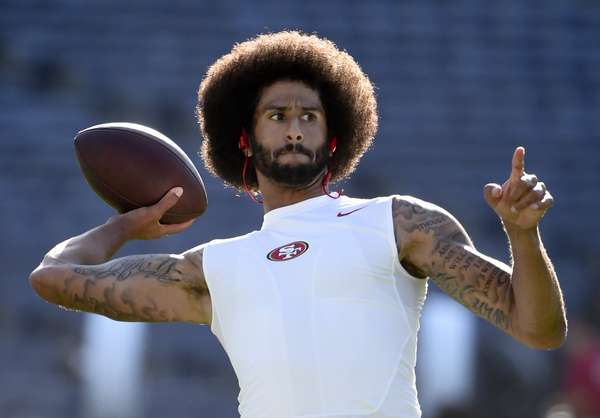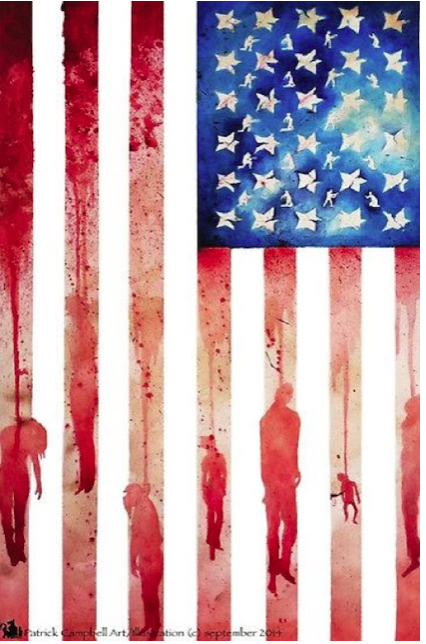
As Colin Kaepernick’s choice to remain seated for the US national anthem continues to highlight and provoke conversation about racism and oppression in the country, I asked attorney and Professor of African American studies at the University of Houston, Dr. Gerald Horne, for his reaction to some of the issues that have been brought to the fore.
The 35 year-old who wrote the US national anthem, Francis Scott Key, appears to have been a remorseless enslaver and abuser of black people, a tireless pro-slavery activist, a religious fundamentalist, and a proponent of genocide and land theft. The full lyrics of his song contain a ghoulish and sadistic call for the mass murder of enslaved black people who might attempt to free themselves from US clutches, as well as evidence of the US intent to continue genocide and land theft campaigns against the Native nations.

It seems that asking a black or Native person to respect or honor this song would be like asking a Jewish person to honor a song written by a Nazi. Even if the most blatantly offensive lyrics were removed, it is hard to imagine that anyone in the US, except maybe a neo-Nazi, would feel any anger towards a Jewish person who refused to honor a song written by, say, Joseph Goebbels.
That the dominant US culture chooses to use as its very national anthem a song written by a genocidal slave-driver, and becomes enraged when a black person chooses not to honor it, illustrates, Horne said, that the US was “founded on slavery and genocide”, but also, crucially, “in denial”. Many scholars have pointed out that national denial is almost never broken unless a nation is militarily defeated and forced to fully acknowledge and atone for its crimes, and even then it is not guaranteed.
Asked if refusal to honor the US national anthem, given its background and surrounding history, should be the norm rather than the exception, Horne replied, categorically and emphatically, “Of course”.
The ruling state in the US invests large amounts of time and money in working to create an association between militant nationalism and sports, a link Horne says “has long been recognized.” The reaction to Kaepernick’s protest has thus been all the more hostile, as he has, Horne points out, “disrupted the narrative” and the “chauvinist” atmosphere, further “inflaming sentiment” against him.

Since Kaepernick’s action began, a few articles, such as in The Intercept and New York Daily News, have noted the US anthem’s gleefully criminal and genocidal elements, though they seem to stop short of making the connection between the sentiments and goals expressed in the anthem and those that drove the US’s 1776 ‘revolution’ as a whole. One of Horne’s areas of expertise, he details this connection in his book The Counter-Revolution of 1776: Slave Resistance and the Origins of the United States of America. Horne asserted to me that, indeed, “like DNA [that is] hard to obscure, the anthem perfectly captures the national essence” of the United States.
One criticism we seem to hear again and again from white people in the US is that Kaepernick is propagating a “victim’s mindset” by attempting to highlight oppression of black people. This seems to reflect a need to believe that either A) the oppression is not real and is in the minds of black people (and domestic and international monitors and observers) or B) that the oppression is indeed real, but it is counter-productive to point it out, implying perhaps there should be no human rights organizations, journalists, or activists anywhere in the world – rather than shedding light on oppression, they are merely encouraging a ‘victim’s mindset’ and should thus keep quiet.

Horne affirmed that A is a typical example, globally and historically, of an attitude displayed by oppressive majority groups, and B an attempt by nationalists – people who conflate their personal identity with the ruling state – to discourage people from exposing ugliness in the national psyche.
Another common response to Kaepernick’s action suggests that instead of sitting through Key’s song, he should give money to help black people. (Kaepernick has hosted charity events and is also giving money.) Asked what he thinks about this suggestion given that the US may owe more than half its total assets in unpaid reparations, Horne said: “I have learned in life that the higher on the pole of success under capitalism, the more profound the insecurity, perhaps because as Balzac said: behind every great fortune is a crime.” Indeed, Horne continues, there is a “gnawing reality” that the US national fortune “is grounded in the massive misfortune of billions of ‘others’—who too know this and are primed for a reversal of misfortune.”
Kaepernick has cited a lack of “accountability” for murders of black people committed by US state forces as one reason for his protest, apparently drawing from the language recently employed by the UN, which noted “a high level of structural and institutional racism” in the US, maintained partially due to a “lack of accountability for perpetrators of [racial] killings despite overwhelming evidence against them, including video footage of the crime, being present.”
He has also said there are numerous other issues related to oppression of African Americans.
Washington’s Blog has pointed, for example, to Amnesty International’s report on the US maintenance of slavery as a “legal” institution under which it continues to work black people and others as slaves on cotton fields and at other tasks, a continuation of the post-Reconstruction convict-leasing slave-system that today generates billions for the ruling state and private corporations. However, many white people in the US (like members of oppressive groups worldwide) are angered by the mere notion and deny that oppression exists in their country.

Horne suggested that some of these people may want to look into issues of “economic inequality… war… sexism…environmental degradation”, but affirmed that “sadly”, it has always been a “hegemonic norm” for the dominant white culture in the US to claim that black people have it good and are complaining about nothing. (This includes during chattel slavery and the Civil Rights era.)
This form of angry “denial” is seen from people who would consider themselves liberal intellectuals as well as from the right. Both sides appear generally blinded to the reality that when a black person tries to highlight oppression and the dominant response is anger and criticism of the black person rather than the oppression, this may be one key insight into why the US remains, as the UN recently noted, “far from recognizing the same rights for all its citizens.”
Horne draws from his historical expertise to suggest that because of the overwhelming hostility they face, anti-oppression movements in the US, to be effective, must coordinate with international allies. How should they go about doing so? Horne said they can “sue the US for reparations and justice in courts abroad … taking advantage of the emerging idea of ‘universal jurisdiction’”, and should “ally–as our ancestors did–with the prime antagonists of US imperialism.”
Robert J. Barsocchini is an internationally published independent writer who focuses on global force dynamics and serves as a cross-cultural intermediary for the film and Television industry. His work has been cited, published, or followed by numerous professors, economists, lawyers, military and intelligence veterans, and journalists. Updates on Twitter.















